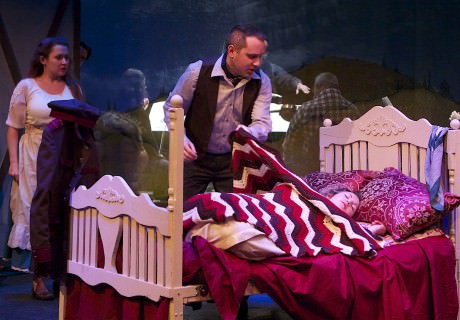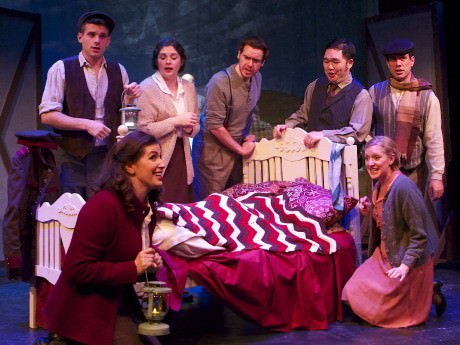It’s eleven o’clock. Do you know where your children are?
A question we’ve become accustomed to, it’s meant to both prod us and reassure us that the “village” is looking out for us, and for our kids. In Vincenzo Bellini’s 1831 bel canto opera La Sonnambula, tho a girl is indeed missing, the question is never asked—because the disappearance is nocturnal and habitual, and when day breaks, her mother finds her just as she left her. After all, the girl’s never given any cause for concern, and besides, when it comes down to it: in European villages of the mid-19th century, what kind of trouble could a fine, upstanding young woman get into?

Well, when upstanding becomes down-lying —and the real lying begins—enough to turn believers into doubters. And a young woman’s dreams . . . into her worst nightmares.
Set in the early 1920s, in a village in the Italian Dolomites—a minor geographical, larger cultural, and major temporal shift from the original, set in the Swiss Alps of the 1830s—Producing Artistic Director Carla Hübner and Director/Writer Steven Scott Mazzola’s production of Vincenzo Bellini’s La sonnambula, in a hot-off-the-presses English translation, brings the opera’s gorgeous score to bel canto aficionados while revealing its head-spinning musical riches to those who have yet to discover them. (The program gives a nod to those who know the opera, listing the arias first in the original Italian, then in the English translation.)
The story is the age-old, incendiary tale of romantic love, rivalry and betrayal, enhanced with hints of the supernatural but having—unlike most dramatic operas—a blissed-out, gloriously happy ending. In brief: Amina and Elvino are about to tie the knot, leaving Elvino’s old girlfriend in knots. Seeing an opportunity to make Elvino think Amina’s been cheating on him, Lisa plays it for all it’s worth—and Elvino falls headfirst into the trap. There’s also Alessio, who’s in love with Lisa; Teresa, Amina’s mother; and Captain Rodolfo, who helps to both tie the knot and untie the skein of deceit.
Now: to the music. The singing, by chorus as well as soloists, is never less than professional; most of the cast has mastered the deceptive ease and fluidity of what has come to be known as bel canto singing, which gave its name to the era in which Bellini wrote his operas, sometimes executing with exquisite, shivers-down-the-spine-producing precision the breathtaking, dizzying floridity of their arias. (The only very small exceptions were the recitatives which—unlike, for example, Mozart’s—are virtually melody-free, making it challenging for the singers to maintain pitch; and the occasional, shoot-for-the-moon arpeggio fireworks, which became so architecturally, mind-bendingly complex, the pitch, perhaps out of a singer’s sheer exhaustion, pitched.)
As Amina, soprano CarrieAnne Winter’s sparkling top notes topped off flawless, Galli-Curci-worthy arpeggios whose rapidity and tessitura were hallmarks of the legendary Italian coloratura, Winters infusing them with a sweetness and innocence—first, jubilant and tenderly joyful; then stunned and crushed from anguish; finally, utterly euphoric—that are the hallmarks of the character.
As Amina’s beloved but bullheaded fiancé Elvino (yet to all appearances, not without reason: Amina’s been caught asleep in the bed of the dashing “mysterious stranger” Rodolfo), Joe Haughton navigates the elaborate fioritura of his arias with aplomb, his burnished, vibrant tenor ringing in passion or rage as Elvino navigates the emotional currents (and undercurrents) of commitment, trust, and love. He and Winter make a thoroughly convincing young couple caught up in the ecstasies of love’s wondrous absoluteness, their voices alternately complementing and competing with each other (not by intent, but in impact) as they rhapsodically profess their eternal devotion. (Their duet may recall for opera lovers—prefiguring, and conceivably even inspiring—Mimì and Rodolfo’s duet at the end of Act I in Puccini’s La Bohème).
So we don’t get caught up in the kitch of it, Mazzola has Amina’s adoptive mother Teresa (Patricia Portillo, whose obvious enjoyment of this silent-film shtick adds a kicky meta level to our amusement) very noisily blow her nose as she happily weeps at the sight of the two love birds. (The T-shirt worn by the technician checking the lighting between Acts was cause for another—unintended?—chuckle: “Off book is a lie.” In a production like this—given Emperor Joseph II’s alleged dismissal of Mozart’s music: “too many notes,” one wonders whether it would have even survived in his court—being “off book” is an almost inconceivable, yet obviously realized, achievement.)
As the jilted Lisa, soprano Kimberly Christie’s pure, sure, gleaming top notes and impeccable, furious arpeggios not only didn’t detract from one’s appreciation of the seething jealousy and pain Lisa’s seized with as she watches her former fiancé’s impending betrothal to Amina celebrated by virtually the whole town. Instead they manifested it, and were a perfect illustration of Hübner’s observation at a Director’s Salon the week before, expressed as a hope, that the show would demonstrate that “ornamentation is not an end in itself, but a mechanism for portraying emotions through music.”
As Captain Rodolfo, Brody DelBeccaro is smooth and mellow, at turns rakish and reticent, not only visually but vocally and dramatically. His “mysterious stranger” has something of Golden Age Hollywood about him—think Ronald Colman, Errol Flynn, Clark Gable—but he will reveal himself to be much more than the sum of his ostensibly superficial parts.

mysterious stranger’s bed. Left to right, Foreground: Christine Browne-Munz,
Mandi Harper; Background: Andrew Pendola, Melissa Chavez, Andrew
Sauvageau, Jason Lee, and Eduardo Castro. Photo by Angelisa Gillyard.
The translation, written by Director Steven Scott Mazzola and commissioned for the production, was idiomatic without being idiosyncratic, so that the occasional slang—and this may be a matter of individual taste—generally enhanced one’s understanding and enjoyment of what was happening without compromising the integrity of either the story or the music. (My favorite admitted groaner was probably when Lisa, asked why she insists on heartlessly dismissing her exhaustingly inexhaustible suitor Alessio (an amusingly convincing Eduardo Castro) replies, with richly focused, soaring tone intricately embellished with runs and scales of impeccable, vocal-cord-challenging, larynx-twisting technique: “I want to live the way I wish! It’s my way or the highway.”)
That the singers are, almost to a person, meticulous in their enunciation also contributes to the success of the production. As an audience member observed at the Director’s Salon, bel canto is hard to sing in English because the sounds of the language are harsh, militating against the mellifluousness of the vocal line—which made the singers’ achievement all the more praiseworthy.
The chorus is accomplished as well, and makes the most of the scene in which the villagers robustly denounce Amina, who’s been found, in a white, lace-trimmed, puffed-long-sleeved nightgown (in a costuming coup, the apparel equivalent of innocent virginity), in the Captain’s quarters, their voices in rousing, angry unison, their remarks and glances, both scripted and seemingly improvised, making each a distinct, individual character. Here Portillo, as before powerfully, but now silently, portrays another side of motherhood, comforting her shattered child, taking her gently into her arms, her face a Pietà of anguish, a twin to her daughter’s.
Costume Designer Donna Breslin told us (at that Salon) that the costumes are not meant to be authentic, but to more generally evoke a time and place, they are in fact a merry hodgepodge of workday and fairytale, contemporary and timeless. Lisa’s brightly colored, white-ruffled-aproned “peasant girl” dress stands in sharp contrast to Amina’s ladylike garb, which goes from the demure to the ethereal, while Rodolfo’s handsome chocolate-brown military uniform with burgundy epaulets, cuffs and collar and matching beret is indeterminately European, but chic.
Osbel Susman-Peña’s inventive Met-set-on-a-budget is manifested most strikingly in the four rolling rectangular vertical panels that serve as the scenery and are combined in various configurations as the scenes change, the singers nonchalantly serving as prop masters (sometimes, never breaking stride, in mid-song). In Act I, two depict hills and mountains and two stone walls; in Act II, they will be turned around, their dull blue serge fabric echoing Amina’s pale blue four-poster king-size bed with burgundy-and-blue-patterned bedspread and coordinating pillow shams. They work in effective tandem with Stefan Johnson’s highly evocative lighting, which creates the illusion of tree branches, the latter embellished with actual baskets of brightly colored artificial flowers at the bottom, suggesting front-yard and window-box gardens.
The chamber players, under the able direction of Musical Director and Conductor Stanley Thurston, provide strong support to the singers (a collaboration aided by a small video screen above the audience), skillfully playing—in both senses of the word—the orchestra. Almost phantom-like, they are stationed behind a scrim at the back of the stage, behind them the form of a distant, greyish mountain, above it a deep blue sky.
Elliott Lanes’ sound design was most evident (and effectively so) with the sound of horses’ hooves and whinnies coming from behind the audience, increasing to a thrilling intensity as the “cavalry” approached.
Upon entering the theater, there was a quiet anticipatory buzz in the vestibule that tingled with the excitement of opening night at the Met. This performance was completely sold out—for good reason—and there are only four more remaining in the run.
By all means, do go see it, and hear it—even if you have to sleepwalk to get there.
Running Time: 2 hours, with one intermission.
La Sonnambula (The Sleepwalker) plays Thursday. January 15th at 7:30 PM, Saturday. January 17th at 8 PM., Friday, January 23rd at 8 PM, and Sunday. January 25 at 2:30 PM at Source – 1835 14th Street NW, in Washington, DC. For tickets, call (202) 204-7760, or purchase them online.





